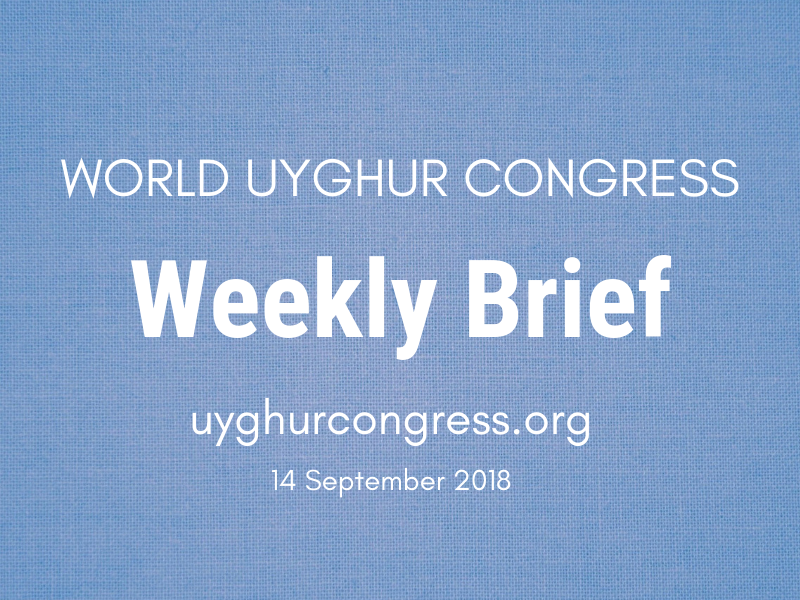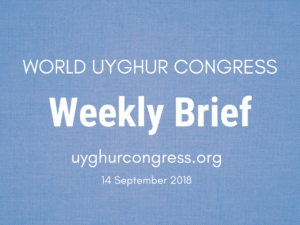WEEKLY BRIEF SEPTEMBER 14

World Uyghur Congress, 14 September 2018
 WUC Representatives to Meet With the U.S. Officials in White House
WUC Representatives to Meet With the U.S. Officials in White House
On Monday, 10 September 2018 the World Uyghur Congress (WUC) President Dolkun Isa and Chairman of the WUC Executive Committee Ömer Kanat paid a brief visit to Washington to discuss the US considering sanctions against culpable Chinese officials. Shortly after the meeting, high-level US officials in the current Administration stated that the US government was currently considering using the Global Magnitsky Act to impose sanctions.
The visit to the White House and subsequent statements from US officials have given hope to the Uyghurs, that the US government is taking important steps to hold China accountable for its serious human rights violations and to protect Uyghurs in the diaspora, but much more needs to be done to improve the situation.
Mr. Kanat discussed the visit with RFA, saying “the hope it conveys to the Uyghur people is that humanity has not died and there are those who care about us and our suffering.”
EU Raises Arbitrary Detention of Uyghurs in Political Indoctrination Camps
The issue of the mass arbitrary detention of Uyghurs in political indoctrination camps in China has started to gain traction in the EU, as the issue was raised during the European Parliament’s Plenary session in Strasbourg.
On Tuesday 12 September 2018, the EU High Representative for Foreign Affairs, Federica Mogherini, publicly stated that EU has focused on situation in Xinjiang (East Turkistan) during the EU-China Human Rights Dialogue, especially the “expansion of political re-education camps” during her speech to plenary session of the European Parliament on the state of the EU-China relations.
Her remarks came during a debate on an important report on EU-China relations, tabled by MEP Bas Belder. The report contained provisions, in paragraph 55, expressing the European Parliament’s concern with the situation in East Turkistan and especially with the arbitrary detention of Uyghurs in the camps. The report was passed by the parliament with a vast majority and we hope it will help to put the issue of the camps firmly on the agenda of the EU in its relations with China.
WUC thanks the EU High Representative for Foreign Affairs and all of the Members of the European Parliament for speaking up for the Uyghur human rights issue in East Turkistan. It gives the Uyghur community hope that the international community is finally waking up to what is happening in East Turkistan, so the Uyghur people will no longer suffer in silence.
The WUC has been urging the EU to be more vocal about the human rights crisis in East Turkistan and to take concrete action aimed at securing the release of all those held in the political indoctrination camps. We continuously urge the EU to stay true to its human rights obligations and European values and take concrete action to address this human rights crisis.
UN High Commissioner for Human Rights Raises Political Indoctrination Camps During HRC 39 Session
On Monday, 10 September 2018 as the new UN High Commissioner for Human Rights, Michelle Bachelet, raised the issue of the mass arbitrary detention of Uyghurs in the political indoctrination camps in her inaugural address to the UN Human Rights Council at the start of the 39th session.
In her remarks, she cited the concluding observations of the UN Committee on the Elimination of Racial Discrimination which expressed its deep concern about reports of the camps and called on China to immediately release all those held in arbitrary detention. She also called on China to let in independent investigators into East Turkistan, in what would be an important step to ensuring justice and accountability for these severe human rights violations.
On Tuesday, 11 September 2018 China’s foreign ministry spokesman Geng Shuang responded to issue raised by the UN High Commissioner saying that Bachelet should “scrupulously abide by the mission and principles of the UN charter”. Geng also said that Bachelet should “respect China’s sovereignty, fairly and objectively”, and “not listen to one-sided information”. The attitude of China towards human rights or any criticism of its human rights record was once again laid bare. It is the duty of the High Commissioner to raise these urgent human rights issues with states and fully compliant with the mission and principles of the UN Charter, of which human rights is a central pillar
The WUC is very encouraged by Ms. Bachelet’s words and hopes that she continues to raise this issue and stand firm on human rights throughout the duration of time as High Commissioner. This is the first time that a High Commissioner or OHCHR has publicly acknowledged the mass arbitrary detention of Uyghurs in the camps and we urge UN bodies and officials to be more vocal on the issue going forward.
Human Rights Watch Published Comprehensive Report on Political Indoctrination Camps
Human Rights Watch published a comprehensive, 117-page report on the political indoctrination camps and China’s persecution of Uyghurs and other ethnic groups. It is titled “Eradicating Ideological Viruses’: China’s Campaign of Repression Against Xinjiang’s Muslims.” The report is the most in-depth look at the camps thus far and over 58 Uyghurs have given their testimony for the report.
The publication of the report made international news and provided important insight into the running of the camps. It also provided further evidence of the serious human rights violations occurring in the camps and should be required reading for anyone interested in the issue.
Malaysia Became the First Muslim Country to Raise Political Indoctrination Camps
Malaysia has become the first Muslim majority country to publicly address the mass arbitrary detention of Uyghurs in political indoctrination camps, according to Free Malaysia Today.
Anwar Ibrahim, due to take over as Prime Minister of Malaysia in the near future, has publicly highlighted the mass arbitrary detention of Uyghurs in internment camps. He also stated the Malaysian government has directly raised this issue with the Chinese government but were told it was an ‘internal issue’.
Furthermore, an article published on Malaysiakini by Rais Hussin, a Malaysian politician, entitled “On the importance of defending Uyghurs and Rohingyas: The Malaysian duty” also stressed Malaysia’s moral responsibility to act on the important issue of tragedies facing Rohingyas and Uyghurs.
Mr. Hussin wrote, “The Uyghurs (…) must be given the benefit of the thought that there are countries that are willing to stand up and speak up on their behalf. (…) Malaysia must not abandon the duty to protect all persecuted human beings.”
It is so important that states substantively raise this issue with the Chinese government, along with other serious human rights issues. The WUC urges other state delegations to follow Malaysia’s example and to raise this issue in their meetings with the Chinese government.
WUC Representative Attending UN HRC 39th Session
For the next 2 weeks, WUC representatives will be attending the 39th session of the UN Human Rights Council to further raise awareness of the political indoctrination camps and to urge member states to speak publicly and take action.
On Thursday, 13 September 2018, WUC Project Assistant Shahrezad Ghayrat spoken at a side event at the UN Human Rights Council organised by UNPO and Society for Threatened Peoples, entitled ‘Unrepresented Women’s Rights – Inclusivity and Intersectionality’.
Ms. Ghayrat spoke about her own experiences and motivations for becoming involved in human rights activism, the current plight of the Uyghur people in East Turkistan (especially the mass arbitrary detention of over 1 million Uyghurs in political indoctrination camps) and the importance of Uyghur women being involved in human rights activism.
The WUC will participate in another side event on 18 September 2018 focused specifically on the political indoctrination camps. The event will bring together Uyghur activists, academics and representatives from prominent human rights NGOs to provide participants with additional evidence of the camps and call for action to be taken.

